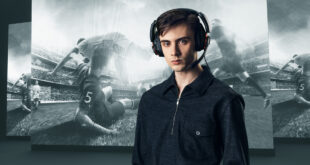The now famed Fable franchise deservedly provides Russell Shaw a lofty and enviable position amid the starry firmament of triple-A video game composers.
Bucking the usual music outsourcing model, he’s a salaried staffer who both defines the game’s music requirements, and personally fulfills them – able to work from concepts and initial ideas at the very earliest stages of the project.
“I’m extremely lucky – I’ve been with
Peter Molyneux for 20 years now and he virtually gives me carte blanche,” says Shaw. “Having his trust really is a privilege. That said, the popularity of the original Fable music is a guiding hand – and sometimes a rod for my back.
“Anything that deviates too far from the fundamental ethos of Fable 1 is considered blasphemy. On Fable II, I took a more musically atmospheric, ambient approach, but with Fable III, I’ve opted for a balance of the two returning to the basic use of the orchestra. It definitely brings out the Fable memories and the blend works – and hopefully it satisfies those fans of the series who contact our message boards asking for more ‘tunes’.”
THE DEEP END
The first Fable was in fact Shaw’s first orchestral score using live players – and something of a baptism of fire, as he explains: “Suddenly I was working with A-grade Hollywood composer, Danny Elfman, who created the main theme for me, which I then developed for the in-game score. I was thrown into the middle of it all and feel lucky that it came out so well.”
Such refreshing and endearing humility belies the fact that Shaw clearly has a singular talent. “I’ve always been a great admirer of people who write beautiful music – it’s always shaped my composition,” he states. “It might sound ‘airy-fairy’ but I’m always looking for that magical beauty. Working with Danny’s theme – the maestro of themes – was an amazing starting point. When you look at peoples’ favourite music from Fable – it’s all the magical fairytale tunes.”
By the time Fable III came around, Shaw was way up the learning curve when it came to orchestration prowess. The music director used periods between projects to research combinations to produce various musical textures and colours – with orchestrator and conductor Allan Wilson as trusted advisor.
WELL COMPOSED
Final composition for Fable III took place over 12 weeks, followed by an eight-week period spent generally tidying and tweaking, taking account of last minute design changes and undertaking full preparation for the red light. Sophisticated placeholder ‘mock-ups’ were created using Vienna and Reason instrument libraries.
Meanwhile, Wilson was given a midifile, mp3 reference and a score printed from Cubase to kick-off his preparation process for conducting duties.
The final orchestral recording took place in eight sessions across four days in Bratislava before the team headed to Pinewood for choir recording and mixing, as Shaw explains: “As ever, the recording was an incredible experience – four months after I was pushing a key on a keyboard hearing a digital string sample through my Adams speakers, there was Allan waving his baton and 80 musicians were playing my music, adding all their wonderful expression and emotion.
“Mixing took place over three days – it’s quite a quick process, partly because engineer Pete Fuchs – whose ears I trust 100 per cent – likes to work that way, and partly because by this stage the tracks kind of mix themselves. They’d already been balanced, so it was largely a question of high quality reverbs and sweetening. Back at my own studio, I added some digital compression to make sure everything sat well together.”
In-game playback is straightforward triggering of cues, apart from the more ‘interactive’ combat music which, at run-time, selects and combines from seven interleaved stems to create variation and increasing intensity to reflect the gameplay experience. Although the core composition comprised approximately 60 minutes of music, this material was intelligently re-purposed to create a final count of around three hours’ worth of score – utilising various orchestral layers recorded separately for each piece as the basis for ‘alt’ versions – for example used when a player re-visits a part of the gameworld later in the story.

 MCV/DEVELOP News, events, research and jobs from the games industry
MCV/DEVELOP News, events, research and jobs from the games industry


